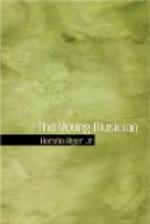Phillip found his father’s watch. It was an old-fashioned gold watch, but of no great value even when new. Now, after twenty years’ use, it would command a very small price at the coming sale.
Ever since Philip had been old enough to notice anything, he remembered this watch, which was so closely identified with his father that more than anything else it called him to mind. Philip looked at it wistfully as it lay in his hand. “I wish I could keep it,” he said to himself. “No one else will value it much, but it would always speak to me of my father. I wonder if I might keep it?”
Philip had a mind to put it into his pocket, but the spirit of honesty forbade.
“It must be sold,” he said, with a sigh. “Without it there wouldn’t be enough to pay what we owe, and when I leave Norton, I don’t want any one to say that my father died in his debt.”
There was nothing else in the desk which called for particular notice or appeared to be of any special value. After a careful examination, Philip closed it and looked around at the familiar furniture of the few rooms which the house contained.
There was one object which he personally valued more than anything else. This was his violin, on which he had learned all that he knew of playing. His father had bought it for him four years before. It was not costly, but it was of good tone, and Philip had passed many pleasant hours in practicing on it.
“I can take this violin, at any rate,” said Philip to himself. “It belongs to me, and no one else has a claim on it. I think I will take it with me and leave it at Frank Dunbar’s, so that it needn’t get into the sale.”
He put back the violin into the case and laid it on one side. Then he sat down in the arm-chair, which had been his father’s favorite seat, and tried to fix his mind upon the unknown future which lay before him.
He had sat there for half an hour, revolving in his mind various thoughts and plans, when he heard a tap on the window, and looking up, saw through the pane the coarse, red face of Nick Holden, a young fellow of eighteen, the son of the village butcher.
“Let me in!” said Nick; “I want to see you on business.”
CHAPTER III.
Nick Holden’s call.
Philip had never liked Nick Holden. He was a coarse, rough-looking boy, his reddish face one mass of freckles, and about as unattractive as a person could be, without absolute deformity. This, however, was not the ground for Philip’s dislike.
With all his unattractiveness, Nick might have possessed qualities which would have rightly made him popular. So far from this, however, he was naturally mean, selfish, and a bully, with very slight regard for truth.
Will it be believed that, in spite of his homely face, Nick really thought himself good-looking and aspired to be a beau? For this reason he had often wished that he possessed Philip’s accomplishment of being able to play upon the violin.




